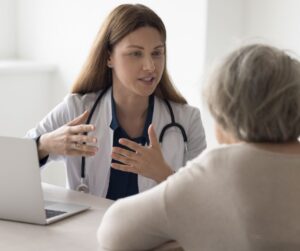Advanced practice provider (APP) leaders face a variety of challenges when it comes to the utilization of APPs in oncology, including setting up a governance structure so that APPs are reporting to APPs, implementing policies that enable APPs to work at the top of their licensure, and measuring APP productivity. The work that APPs do in oncology varies from state to state and from practice to practice. With few resources specific to APP utilization in oncology practice, APP leaders are often on their own to figure it all out. Now APP leaders in oncology have a new resource to turn to—each other.
A first-of-its-kind conference, the Oncology APP Leadership Forum 2024, brought together APP leaders from varied hematology/oncology practice settings to learn from and support each other. Sponsored by Horizon CME, the conference was designed to provide experienced as well as aspiring APP leaders with the knowledge, skills, and inspiration they need to become more effective leaders in their organizations and communities.
The conference was held in conjunction with Horizon CME’s APP Oncology Summit (APPOS) in Las Vegas in February. APPOS is a series of 2-day continuing education conferences for APPs including nurse practitioners (NPs), physician assistants (PAs), pharmacists, and registered nurses.
Amy Raedeker, DNP, ARNP, AGACNP-BC, AOCNP, is the APP program director at Mission Cancer + Blood, an 18-physician community oncology practice in Des Moines, Iowa. She participated in the conference and served on the Oncology APP Leadership Forum’s planning committee. She is also helping to plan APPOS Kansas City.
“The biggest thing about the forum that I wanted to do was talk to other APP leaders that practice in medical oncology and to learn what works for them, what doesn’t work for them, how they lead their teams, and how they practice,” Raedeker said, adding that the conference gave her the opportunity to network with APP leaders from MD Anderson Cancer Center, in Houston, and to learn about their onboarding program and educational initiatives—learnings that she can put into clinical practice in her program in Des Moines.
“There are so many different organizations; academic vs community oncology is a totally different scenario, but there are many instances where I can take what they are doing in an academic setting and apply it to my community oncology setting,” said Raedeker, who manages 38 APPs.
In addition to onboarding, conference sessions covered measuring productivity and value, linking productivity with financial incentive plans, empowering and advocating for APPs, and how to talk to administration—all within the oncology setting.
Oncology Is Different
“There are a lot of conferences for APP leaders, but the way somebody leads a team of orthopedic APPs is very different than the way to lead a team of medical oncology APPs,” Raedeker said, explaining that it takes a special person to take care of oncology patients. She also cited high rates of turnover as well as burnout, the ongoing shortage of medical oncologists, and oncology APPs that are practicing in rural areas of the U.S. that have limited or no physician support.
“There are still APPs that can’t write prescriptions for narcotics or write chemotherapy orders, or they have to work directly with the physician day in and day out. There are also still APPs that are not practicing at their highest level of practice. Some folks are still working as scribes for physicians vs working in their role as APPs,” she said.
APP Utilization in Oncology
“It’s very much not well understood how to use APPs in oncology,” said Marilyn Douglas, MSN, FNP-BC, OCN, executive director of nursing, advanced practice at City of Hope, Duarte, CA
Contrasting the role of APPs in oncology with APPs in primary care, Douglas said, “In primary care, you see 4 patients an hour and that’s the end of it. They know exactly what they want. They want you to see patients and follow up on the visits. But when the physician is the provider that people come to see, what then do you do? Where is the APP best used? How do you measure their productivity? How does their value influence how many sessions they have? What kind of dashboard should you be using? There are so many questions.”
According to Douglas, the literature on APP utilization in oncology is not supportive. “They all say kind of the same thing and that is productivity is measured in RVUs,” Douglas said. “We know that. They make generic statements, but they all conclude that there is no consensus on how to use an APP in the ambulatory setting. They are leaving it up to us to figure it out.”
Confounding the issue differences in scope of practice state by state, and even in the same building where the surgeons want to utilize APPs one way and the medical oncologists want them to do something different. “It makes it very difficult to manage the practices when there is no consensus,” Douglas said.
“Because I know these issues exist and I’m still chewing through them myself, I asked [Horizon CME President] Brian Lee what he thought about having just a forum for leaders because I was sure the leaders have questions,” Douglas said, “and I was right.”
“We’re Not Alone”
Spending time with other oncology APP leaders helped Douglas and her leadership team to understand that APP leaders in oncology throughout the country are facing the same issues and many of the same frustrations. “We’re not alone,” she said. “After the forum we understood that everyone is going through the same thing. Then you start getting ideas from what others are doing.”
She was particularly struck by the growth that she witnessed as less experienced APP leaders learned from more experienced leaders at the conference. “There was really an opportunity for APP leaders from different regions to be in the same room to talk it out. So you have the very matured and the novice and just having the opportunity to hear. It’s the peer mentoring effect.” she said.
Douglas said she would like to see the conference held yearly. “Our roles are changing rapidly. The legislative changes that are happening state by state are increasing or supporting the expansion of scope of practice. Those changes both for the NP and for the PA are not always well understood or spoken about. And there are still so many more topics that we were not able to cover. I think it’s very much necessary,” she said.
Common Issues
For an experienced APP leader like Todd Pickard, DMSc, PA-C, DFAAPA, FASCO, executive director at MD Anderson Cancer Center in Houston, and an APP leader for almost 20 years, the conference was an opportunity to network and hear how other APP leaders are trying to address common issues and helping them think through it.
Pickard said he receives a lot of professional satisfaction helping others. “That’s part of why I went into administration leadership. It’s really about this desire, that there’s problems, there’s solutions, I should connect those things, and then whatever I’ve learned I should teach others so they can do it too,” he said. “I find that professionally and personally rewarding,”
In his presentation, “How to Talk to the C-Suite,” his goal was to help APP leaders embrace their executive role. “PAs and NPs are learning how there is space and a need for leadership and governance, and we do have value and worth, and we’re not imposters in the C-suite. We should be there, we are executives, and we contribute very meaningfully to the mission of the care of the cancer patient,” he said.
Helping PAs and nurse practitioners understand that they should also be part of how decisions are made can be challenging “because the culture sometimes dismisses us,” he said.
“APPs should be involved in how we decide to deliver care, what service lines, how we solve access issues, and quality and safety issues. Cancer is a team effort. It’s not just about physicians or pharmacists or nurses or financial folks,” Pickard said. “It’s about what we as PAs and NPs also contribute and our thoughts and our ideas because we’re so much on the frontline. We have a perspective that is unique, and we should be part of the team that helps make decisions and creates solutions. Helping people understand that – there’s a great need for that.”
The Need for APP Leader Education
It wasn’t until Douglas brought it to his attention that Brian Lee, PharmD, medical director at Horizon CME, realized there is a need for education among APP leaders in oncology.
“Marilyn [Douglas] had brought up the fact that she was being invited to a lot of nursing leadership conferences. She was saying I’m tired of being invited and sitting on nursing leadership panels. I need a conference for me as an APP leader in oncology,” Lee recalled. “I said I would be interested in developing and meeting the needs of APP leaders because that’s what we focus a lot of our education is toward APPs and if you as an APP leader need something we would be happy to see what we can do to provide that.”
Lee said he was gratified by the sense of community that developed among participants. “Now they have people they could potentially reach out to talk about and discuss and learn from each other how they might manage or solve those problems. I think that was very enlightening for a lot of the APP leaders who attended the conference,” he said.
Horizon CME plans to continue to offer the Oncology APP Leadership Forum, according to Lee, and they are exploring other ways to foster the community that was formed at the first conference.
For more information or to register go here.







